Welcome back to This Week in Apps, the Extra Crunch series that recaps the latest OS news, the applications they support and the money that flows through it all.
The app industry is as hot as ever, with a record 204 billion downloads and $120 billion in consumer spending in 2019. People are now spending three hours and 40 minutes per day using apps, rivaling TV. Apps aren’t just a way to pass idle hours — they’re a big business. In 2019, mobile-first companies had a combined $544 billion valuation, 6.5x higher than those without a mobile focus.
In this Extra Crunch series, we help you keep up with the latest news from the world of apps, delivered on a weekly basis.
This week, we’re taking a look at how the civil unrest and George Floyd protests played out across the app stores. The events led some apps — including private messaging apps, police scanners and alerting apps, and other social communication apps — to surge, and even break records. Google decided to delay the launch of Android 11 beta 1 in light of the recent events.
We’re also keeping up with COVID-19 apps and how the pandemic is changing app usage and consumer behavior. Plus, the FTC fined an app developer over privacy violations in a warning shot for the app industry; Zoom faced criticism for its encryption plans; Apple launched an open-source resource for password managers; and more.
How the George Floyd protests impacted the app stores
Protests drive downloads of police scanners
Downloads of police scanner apps, tools for private communication and mobile safety apps hit record numbers last weekend in the U.S., amid the nationwide protests over the police killing of George Floyd, as well as the systemic problems of racial prejudice that plague the American justice system. According to data from app store intelligence firm Apptopia, top U.S. police scanner apps were downloaded a combined 213,000 times last weekend, including Friday — a 125% increase from the weekend prior and a record number for this group of apps.
The group of top apps included those with similar, if somewhat generic, titles, such as Scanner Radio – Fire and Police Scanner, Police Scanner, 5-0 Radio Police Scanner, Police Scanner Radio & Fire and Police Scanner +.
Citizen, Signal and others spike during protests
In addition to tracking police movements with scanners, protestors organized and communicated on secure messaging app Signal. Meanwhile, community safety app Citizen, which sends out police alerts, also saw a jump in usage. According to Apptopia, Citizen and Signal both set daily download records, Vox noted earlier this week.
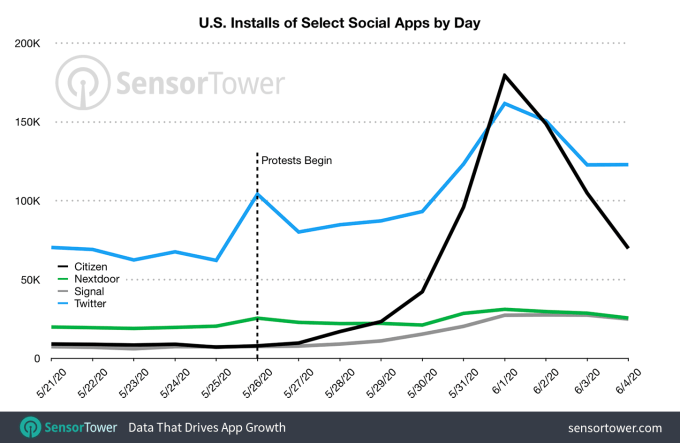
Citizen
Citizen’s app lets users see “incidents,” based on radio communications with 911 dispatchers, police, fire departments and other emergency responders. The app uses high-powered scanners to tune into public radio channels, then digitizes and transcribes the audio, and turns those into incidents placed on the map. But the app is popular because it’s more than a police scanner; it includes a social networking layer where users can react and comment.
Based on more recent data provided to TechCrunch by Sensor Tower, Citizen was installed around 620,000 times by first-time users in the U.S. during the past week, an increase of about 916% compared to the week prior. First-time installs reached a record 150,000 on June 2, nearly 12x the app’s average of 13,000 daily first-time installs during May. On average, the app was downloaded close to 86,000 times per day, or 6.6x larger than May’s daily average. The app grew to be as high as No. 4 on Tuesday, June 2 on the U.S. App Store, and is now No. 32 Overall on the top free charts.
Signal
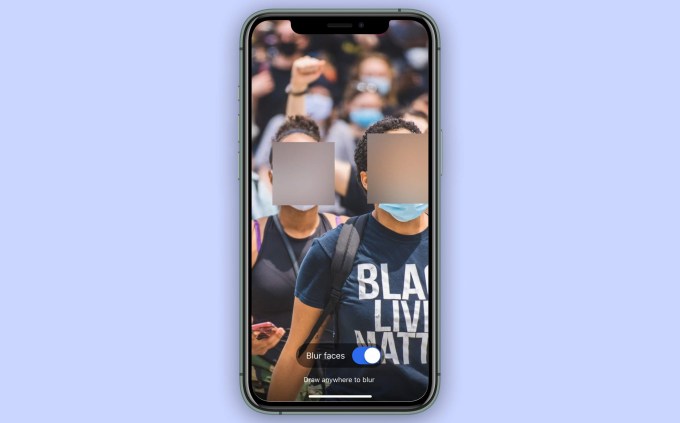
Image Credits: Signal
The firm also estimated that Signal had been installed by approximately 135,000 first-time users in the U.S. during the past week across the app stores. This figure represented growth of 165% from the preceding seven days, or about 2.6x that total of approximately 51,000 new installs. Signal averaged about 19,000 installs per day over the past seven days.
For comparison’s sake, Signal was downloaded around 269,000 times in all of May and its average daily number of installs was 9,000. That makes the average for the past week about 2x higher.
Signal is currently ranked at No. 137 among the top free iPhone apps on the U.S. App Store. Earlier, it was ranked at No. 107 on Tuesday, June 2.
This week, Signal also added built-in face blurring for photos, to help better secure the sharing of sensitive information across its network.
Nextdoor and Neighbors by Ring
The civil unrest also impacted neighborhood networking app installs, as communities looked to share information about the protests with one another. Social networking app for neighbors Nextdoor was installed by 185,000 first-time users in the U.S. over the past week, an increase of 26% from 147,000 installs in the week prior. The app also jumped up nearly 50 places in the U.S. App Store rankings, moving from No. 2,014 to No. 156 in the top free iPhone apps chart.
Amazon-owned Neighbors by Ring, where neighbors share alerts, including security camera footage, was installed by 36,000 first-time users in the past week, an increase of 89% from its approximately 19,000 installs the week prior.
Twitter has a record-breaking week as users looked for news of protests and COVID-19
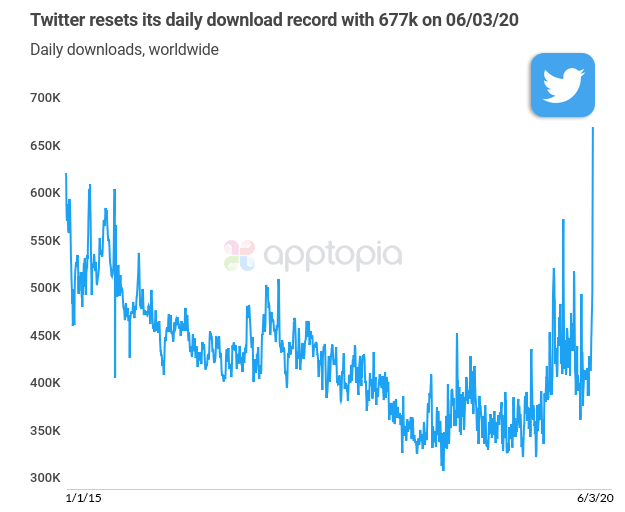
Civil unrest due to the nationwide George Floyd protests drove Twitter to see a record number of new installs this week, according to data from two app store intelligence firms, Apptopia and Sensor Tower. While the firms’ exact findings differed in terms of the total number of new downloads or when records were broken, the firms agreed that Twitter’s app had its largest-ever week, globally.
The app saw at least 677,000 installs at its highest point, Apptopia said. Sensor Tower said it topped 1 million. Twitter also broke a record for daily active users on Twitter in the U.S., when some 40 million people in the U.S. logged into the app on June 3, Apptopia noted. For comparison’s sake, Twitter reported its app had 31 million “monetizable” daily active users (mDAUs) in the U.S. in Q4 2019, which grew to 33 million in Q1 2020.
The spike in installs was attributed to the protests, which were being watched by a global audience, and COVID-19, which continued to spread in worldwide markets.
Apps turn their icons black in support of George Floyd protests
A small handful of apps did the equivalent of the Instagram black square by turning their icons black this week as a gesture of support toward the protests and civil rights. Participating apps included Reddit, Joss & Main and Shop Avani, for instance. Moves like this can be criticized as being merely performative, but one of the companies involved — Reddit — later followed up with real action. Reddit co-founder Alexis Ohanion on Friday announced he was resigning as a member of the Reddit board, and is now urging them to fill his seat with a black candidate. He also said he would use his future gains from Reddit stock to serve the black community, starting with a $1 million pledge to Colin Kaepernick’s Know Your Rights Camp.
COVID-19 app updates and news
The pandemic continues, though it was not the focus of this week’s news coverage, for obvious reasons. But several COVID-19 app stories still made headlines:
- U.S.: A bipartisan group of U.S. senators on Monday introduced a bill to regulate contact-tracing apps, CNET reported. The proposal, called the Exposure Notification Privacy Act, will seek to ensure that people cannot be forced to use the contact-tracing technology.
- U.S.: The Apple Research app was updated this week with a new COVID-19 survey. The survey in the Heart and Movement Study aims to uncover how COVID-19 is changing daily life.
- France: The contact-tracing app StopCovid was released this week, after weeks of intense debate. France chose not to use Apple and Google’s contact-tracing API. Instead, a group of researchers and private companies worked on a separate, centralized architecture. From the start, France’s contact-tracing protocol ROBERT has raised privacy concerns, but the country’s data protection watchdog CNIL said the app was compliant with regulations.
Other headlines
Google pulls “Remove China Apps” app from Play Store
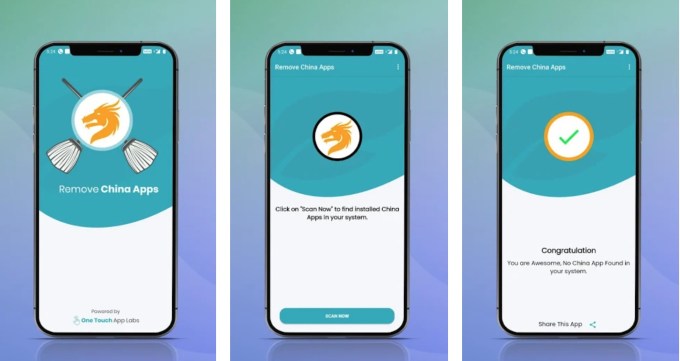
An app called “Remove China Apps,” which allowed users to detect and delete apps developed by Chinese firms, recently became popular in India. The app had been installed more than 5 million times between late May and early June, as anti-China sentiment in India grew. In part, this negative sentiment was fueled by increased tensions over a Himalayan border dispute that escalated in recent days. But Indian users had also been angry with TikTok over its content moderation failures, and were concerned about Chinese smartphone makers’ dominance in India’s market.
This week, the “Remove China Apps” app was pulled from the Google Play Store for violating the store’s Deceptive Behavior Policy. The policy states an app cannot make changes to a user’s device settings or other features outside of the app, without the user’s knowledge and consent, and it cannot encourage or incentivize users into removing or disabling third-party apps.
Anti-China sentiment could end up being trouble for many app publishers, including ByteDance and UC Browser, which count India as their biggest overseas market.
FTC fines kids’ app developer HyberBeard $150,000 for its use of third-party ad networks in COPPA violation

The U.S. Federal Trade Commission (FTC) this week announced a settlement of $150,000 with HyperBeard, the developer of a collection of children’s mobile games over violations of U.S. Children’s Online Privacy Protection Act Rule (COPPA Rule). The company’s applications had been downloaded more than 50 million times on a worldwide basis to date, according to data from app intelligence firm Sensor Tower.
A complaint filed by the Dept. of Justice on behalf of the FTC alleged that HyperBeard had violated COPPA by allowing third-party ad networks to collect personal information in the form of persistent identifiers to track users of the company’s child-directed apps. And it did so without notifying parents or obtaining verifiable parental consent, as is required. These ad networks then used the identifiers to target ads to children using HyperBeard’s games.
The company’s lineup included games like Axolochi, BunnyBuns, Chichens, Clawbert, Clawberta, KleptoCats, KleptoCats 2, KleptoDogs, MonkeyNauts and NomNoms (not to be confused with toy craze Num Noms).
In HyperBeard’s settlement with the FTC, the company has agreed to pay a $150,000 fine and delete the personal information it illegally collected from children under the age of 13. The settlement had originally included a $4 million penalty, but the FTC suspended it over HyperBeard’s inability to pay the full amount.
The fine is meant to serve as a warning to other app developers, that simply writing that an app isn’t meant for kids under 13 doesn’t exempt you from children’s privacy laws.
Kids now spend nearly as much time on TikTok as on YouTube in U.S., U.K. and Spain
A new study on kids’ app usage and habits indicates a major threat to YouTube’s dominance, as kids now split their time between Google’s online video platform and other apps, like TikTok, Netflix and mobile games like Roblox. Kids ages four to 15 now spend an average of 85 minutes per day watching YouTube videos, compared with 80 minutes per day spent on TikTok.
These metrics spiked even more during COVID-19 lockdowns:
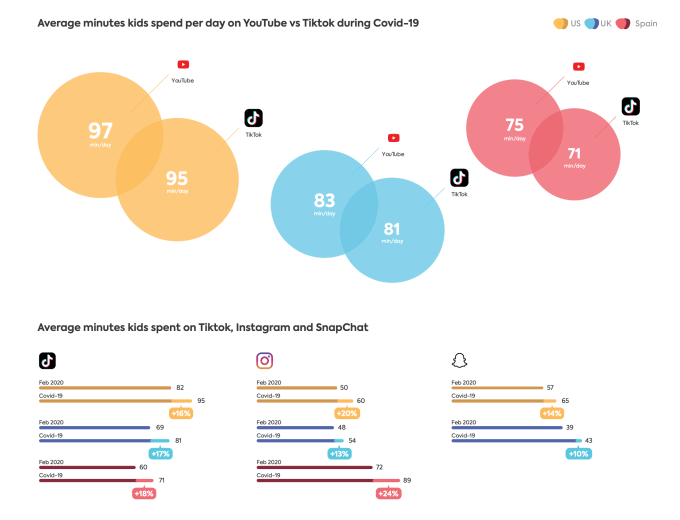
The report also delved into kids’ usage of gaming apps, like Roblox and Minecraft, and educational apps, like Google Classroom. The detailed finding are available here on TechCrunch.
Strong App Store sales prompt analyst to raise Apple share price
Morgan Stanley analyst Katy Huberty raised her target Apple share price to $340 this week, citing strong App Store performance, AppleInsider reported. The high engagement driven by the pandemic could be the new normal, she said.
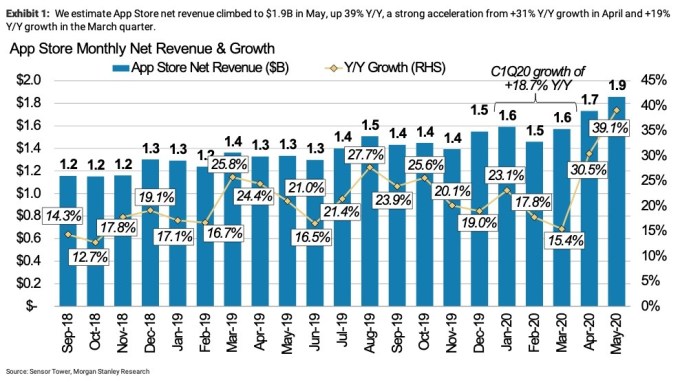
That same sentiment was echoed throughout the week, including in the above data around kids’ app trends and a Nielsen report about increased TV viewing. Despite the lifting of government lockdowns, screen time, TV viewing and app usage remain above pre-COVID levels, leading analysts to believe the pandemic accelerated the growth that was already underway.
Twitch booms under lockdowns
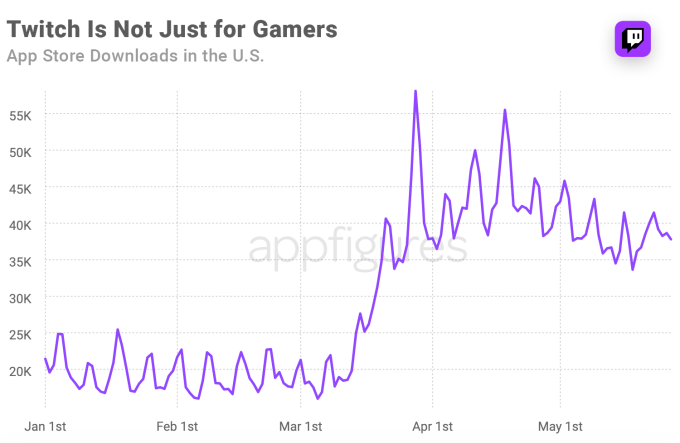
Twitch’s mobile app more than doubled its downloads during the U.S. coronavirus lockdowns, according to recent data from AppFigures. It found that downloads in the U.S. App Store more than doubled during the lockdowns, shifting from about 20,000 per day to a peak of 60,000 in a single day in late March. Although now the trend has a slight negative slope, U.S. downloads are still at more than double what they were in January, AppFigures said.
More iOS leaks emerge
Apple may introduce a new service bundle that includes Apple Music, Apple TV+ and more in a single subscription in a future version of iOS, according to 9to5Mac. The site had gained access to iOS 13.5.5 beta code, so this is a rumor based on that finding, not sourcing. But internal files and code snippets have allowed for many discoveries that later turn out to be true.
The site also reported that iOS 14 may include a built-in translator in Safari and full Apple Pencil support on websites.
Layoffs hit Monzo, Acorns and others
U.K. challenger bank Monzo, is laying off up to 120 U.K. staff as a result of the coronavirus crisis and resulting economic downturn. Similarly, stock market investing app Acorns this week also laid off between 50 and 70 people, and Brex laid off 62 staff members. Even though in some cases companies are growing, the pandemic has forced businesses to reevaluate how they’re spending money.
Google delays Android 11 beta
In light of the current events, Google pushed back the release of Android 11 beta, and its planned The Beta Launch Show. The company on Twitter said “now is not the time to celebrate.” The event will be rescheduled to a future date. The company had already delayed the first beta due to COVID-19, but says it still plans a final release of Android 11 in Q3.
Fortnite maker Epic Games says it aims to bring its games store to Android and iOS
Epic Games CEO Tim Sweeney wants to bring its digital launcher, the Epic Games Store, to Android and iOS devices in the future, according to an interview with GameSpot. On iOS, the launcher would be in conflict with an App Store policy about apps that are used to distribute other apps. But perhaps Epic believes anti-trust investigations will lead to regulation that will open up the App Store further down the road.
Zoom faces criticism over encryption plans
Zoom fumbles its security yet again. This week, Zoom CEO Eric Yuan said that the video conferencing app’s forthcoming end-to-end encryption feature will only be available to paid users. The company believes the decision is necessary so it can provide law enforcement with access to call content, per Bloomberg.
“Free users for sure we don’t want to give [e2e encryption] because we also want to work together with FBI, with local law enforcement in case some people use Zoom for a bad purpose,” Yuan said on Zoom’s earnings call.
Not surprisingly, security experts condemned this decision.
Watchful launches a mobile product intelligence startup to uncover apps’ unreleased features
Call it Jane Wong-as-a-service. A new Tel Aviv-based startup called Watchful is democratizing access to apps’ hidden features. The company tries to identify features that are being tested before getting rolled out to everyone by looking into the app’s code for unreleased features, works-in-progress and A/B tests. This could give developers an advantage by alerting them to their competitors’ plans.
TikTok owner ByteDance shuts down news aggregator TopBuzz
ByteDance has shut down its AI-based news aggregator TopBuzz, one of its earlier global products. According to Reuters, the company said the decision was due to shifting priorities. Launched in 2015, TopBuzz was the international equivalent of ByteDance’s Chinese news aggregator Jinri Toutiao and was one of the company’s first successes.
Apple launches new resources for Password Manager Apps
Apple on Friday announced a new open-source project to help developers of password managers collaborate to create strong passwords that are compatible with popular websites. The Password Manager Resources open-source project allows password managers to integrate website-specific requirements used by the iCloud Keychain password manager to generate strong, unique passwords. The project also contains collections of websites known to share a sign-in system, links to websites’ pages where users change passwords and more.
Funding and M&A
- Lili raises $10 million for its freelancer banking app. CEO Lilac Bar David explained that many of the neobanks are very focused on the consumer side. This app is designed for freelancers like designers, programmers, fitness instructors, chefs and beauty professionals, for example.
- Endlesss, the collaborate music-making app from Tim Exile, is raising funds on Kickstarter. It’s approaching $100,000.
- Challenger bank Varo, soon to become a real bank, raises $241 million Series D. The company competes with Simple, Chime, Current, N26, Level, Moven and others.
- Workforce training app developer Poka adds strategic investor, SE Ventures, the venture capital arm of the European energy and automation conglomerate Schneider Electric. The company has raised over $23 million to date for its app and software services package that providing training and tips for factory workers.
- Zynga acquired Turkey’s Peak Games for $1.8 billion, after previously buying its card games studio for $100 million in 2017. Zynga tried to create its own Candy Crush rival with World of Candy, which never took off. Meanwhile, Peak’s Toon Blast and Toy Blast became high-grossing titles.
- Winning bidder for Grindr has ties to the dating app’s current Chinese owner. Reuters uncovered that the investor group, San Vicente Acquisition LLC, which received U.S. approval to buy Grindr for $600 million, has financial and personal links to the app’s Chinese owner, Beijing Kunlun Tech Co Ltd. This would be a departure from the current national security policy on such deals. The Committee on Foreign Investment in the United States declined to comment to the news organization.
- U.S. private equity firm Silver Lake said Friday it’s buying an additional stake worth $600 million from the top Indian telecom operator, Reliance Jio Platforms.
Downloads
Parachute
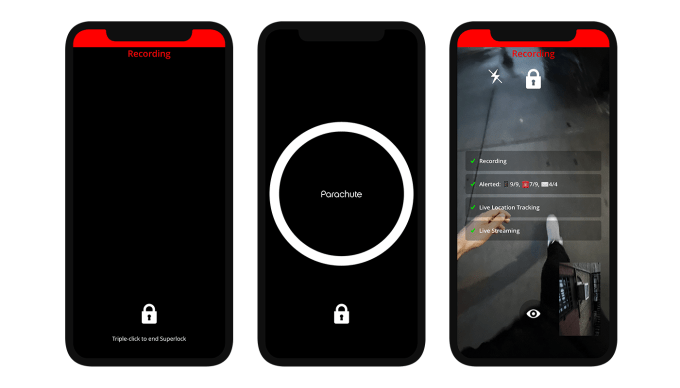
Mobile safety app Parachute this week rolled out a new feature that will prevent an unauthorized person who grabs your iPhone to stop it from recording live video, even if they attempt to turn off the phone entirely. The timely update arrived amid the nationwide George Floyd protests against police brutality and the systemic racism present in the American justice system. The new feature, Superlock, works in tandem with Apple’s Guided Access to lock down the user’s phone. After setting up Superlock as instructed, you can put Parachute in Superlock mode at any time by triple-clicking the power button. The app will keep recording the video and lock down your iPhone until the power button is triple-clicked and the passcode is re-entered.
PhotoRoom

French startup PhotoRoom this week debuted its simple, single-purpose app for removing the background from your photos and choosing another. There are numerous image editing apps that do the same, but this is a dedicated app for the experience, which is useful for those times when background replacement is all that’s needed — such as when taking photos for an e-commerce site, for example.
Other downloads of note include:
- Peleton hits Apple TV app store, finally.
- Camera+ 2 for iOS was updated with a Magic ML feature allowing for one-touch photo improvements using machine learning. Also, this is how to do release notes on the App Store, folks.
- Zigazoo aims to be an educational “TikTok” for kids. The idea is to offer a similar user experience for browsing videos, but with a focus on kid-friendly, educational content. Cool idea, but kids usually know when you’ve tried to sneak vegetables onto their plate.

